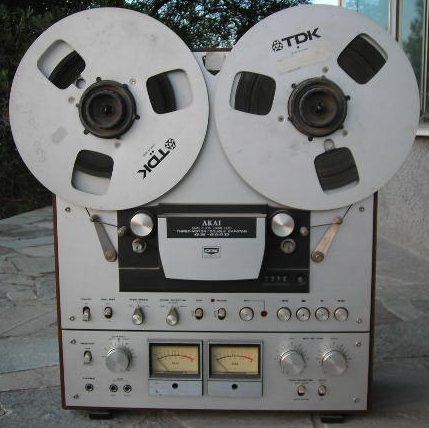AKAI GX-650D
The GX-650D is absolutely the more professional version of the GX-630D and might also be the successor of the GX-400D, although it was not available in a 2 Track Stereo version. This set has 3 speeds (3.75, 7.5 and 15 i.p.s.) and a belt driven, dual capstan mechanism.
The GX-650D main motor is the servo-controlled, model SCM3-16TW. Both pinch rollers are activated by their own solenoids, there’s another solenoid to pull the tape guides and another one to release the brakes. The tape path is symmetrical. The GX-650D is one of the only sets which has a Hall Effect Sensor near the left reel motor which checks if the left reel table is still in motion. By means of this sensor, a quick change between tape functions can be accomplished.
Finally, this 4 track, 2 channel set has an S.O.S. switch and a cue function.
The GX-650D uses the same Servo-Controlled Capstan Motor and belt drive system to power two flywheels with dual center capstans at 15 ips, 7.5 ips and 3.75 ips, as in the GX-400D, GX-400D-PRO, GX-400D-ss, and PRO-1000. Behind the reels, the GX-650D has the outer-rotor reel motors later found in the GX-630D.
Yet, unlike the other later Akai sets with the exception of the Servo-Control Board, as seen in the GX-400D, the GX-650D has no PC boards in common with any other Akai.
GX-650D Specifications
Track system: 4-track, 2 channel stereo system
Tape speed: 3.75, 7.5, 15 ips.
Total Wow and Flutter: Less than 0.055% @ 7.5 ips
Frequency response: 30 to 30,000 Hz +/-3 dB @ 15.0 ips (Akai LN tape)
30 to 26,000 Hz +/-3 dB @ 7.5 ips
30 to 20,000 Hz +/-3 dB @ 3.75 ips
S/N ratio: Better than 58 dB @ +6 VU
FFWD/RWD time: 120 sec. using a 2400 ft. tape
Main motor: SCM3-16TW Servo-Controlled Motor
Reel motors: Eddy current outer rotor motor; model: 24XO-TD
Heads
Erase Head: E4-260
Recording head: R4-200 (GX)
Playback head: P4-202 (GX)
Dimensions: 524 (H) x 442 (W) x 258 (D) mm.
Weight: 26.2 kg.
Power consumption:
Listed new: $ 1330.00 in 1976
Κανένα άλλο AKAI μαγνητόφωνο δεν μπορεί να χτυπήσει αυτό το μοντέλο σε ποιότητα. Οσο και να μην το πιστεύετε οι ψηφιακές εγγραφές με TAD, Mini Disk, Computer κ.λ.π., μπορεί να έχουν καλύτερο λόγο σήματος προς θόρυβο, αλλά η ποιότητα του ήχου τους δεν μπορεί να συναγωνιστεί τον ήχο και την σχεδόν απεριόριστη δυναμική ενός τέτοιου μαγνητοφώνου.

